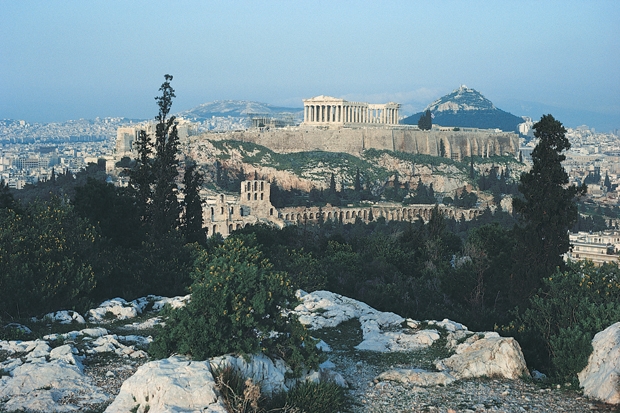[audioplayer src=”http://traffic.libsyn.com/spectator/TheViewFrom22_16_April_2014_v4.mp3″ title=”Paul Mason on why Athens is the place to go” startat=1192]
Listen
[/audioplayer]Where in the developed world can you ride a moped, minus helmet, at 2 a.m. under the noses of weary riot cops, when your night out has only just begun? Athens of course. Greece is in its sixth year of recession and crisis but this is still one of Europe’s great cities for culture, food, drink and entertainment.
First stop: Bouzoukia. Forget all your troubles as you spend the small hours listening to live Greek pop music of a kind that makes The X Factor look underproduced. Despite the austerity, young Greeks say they will never sacrifice their nightlife and here is the proof. Most of the Bouzoukia venues are found along the coast between Glyfada and Pireas: April to July is the summer season. The respectable hour to leave is when all the carnations have been thrown and the street cleaners are starting their morning shift.
After a stiff freddoccino at dawn, a walking tour is called for. The Dopios team is a Greek start-up which pairs tourists with locals for a unique way to discover the city. Immerse yourself in the spirit of resistance and tour the graffiti of anarchist Exarhia; or learn more about the everyday life of ancient Athenians by strolling through the alleys of Plaka and Monastiraki; or trek up Lycabettus Hill for a two-hour painting session.
If you’re lucky you may even be able to catch philosopher James Head, whose Tuesday morning walk-and-talk beneath the Acropolis takes you to the best viewpoints in Athens, where you will consider Aristotle’s views on how to structure cities.
Inevitably, in Athens, you crave a quiet, green refuge away from traffic noise and tourism. Fortunately there is one smack in the centre: the garden café of the Numismatic Museum, on Panepistemiou, in what was once the mansion of Heinrich Schliemann, who discovered Mycenae.
During the crisis, Athenian theatre has had a tough time, but there are still many plays being put on in the city, some of them in the open air. This year, the Athens Festival is collaborating with the Diazoma Association, opening up ancient amphitheatres for productions. This summer there’s the chance to see performances by actress Isabella Rossellini, Nana Mouskouri and the rising Greek singer Monika. Alternatively, try one of the open air cinemas: at Thission, if you get bored with the movie, there’s a view of the Acropolis just beyond.
You can’t leave Athens without eating at a mezopoleio, where you can sample a wide variety of Greek cuisine. One of the most authentic, Strofi, is in Perama. It’s busy but everyone helps by writing down their own orders on the owner’s notepad. As well as octopus and kalamari, the fried courgette and fresh bakaliaro fish are a must.
To experience Athenian nightlife of a gentler era, try Batman bar, where they play classic Rebetica music and folk sounds from the 1950s and 1960s. Look for the sign of the black cloak: the place is deliberately difficult to spot. Once inside, you will find it completely packed, full of cigarette smoke and nostalgia.






Comments